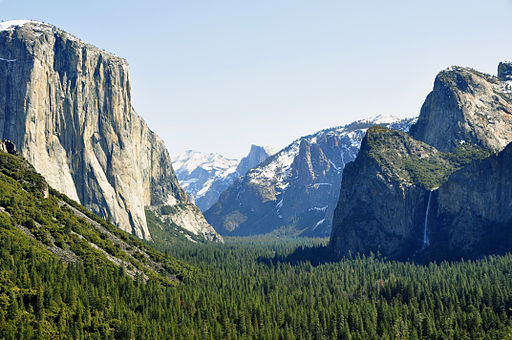By Michael Doyle
WASHINGTON — Salvage logging could speed up on fire-scarred federal land near Yosemite National Park, under an amended bill passed by a divided House on Wednesday.
If the Senate goes along, the Yosemite-area logging would be exempt from the usual environmental challenges and could not be stopped by courts. In theory, the expedited logging would boost employment while protecting forests left vulnerable by last year’s devastating Rim Fire.
“If we are to stop the loss of this forest land, the dead timber has got to come out now,” said Rep. Tom McClintock, R-Calif. “If we wait for the normal bureaucratic reviews and litigation, we will have lost this forest land for decades.”
The House approved McClintock’s measure as part of a larger package of public lands bills. But as with other legislation approved by the Republican-controlled House, the overall bill’s long-term prospects are uncertain. The House approved the overall bill by a 220-194 margin, with only six Democrats in support.
The U.S. Forest Service opposed the initial Yosemite-area logging bill, though the measure has since been revised, and so far neither of California’s two Democratic senators has publicly voiced support. Critics call the logging measure, and the 33-page package of which it’s a part, unnecessary and environmentally pernicious.
“Indiscriminate salvage logging threatens these precious forests,” said Rep. Raul Grijalva, D-Ariz., further noting that “salvage logging is extremely controversial.”
The White House on Wednesday formally declared that it “strongly opposes” the overall public lands measure, citing in part the original version of McClintock’s Sierra Nevada logging proposal. On the other hand, House Democrats did not really mobilize Thursday against the revised bill, and some suggested it’s starting to get better.
The logging bill approved Thursday refines a measure introduced last September as the Yosemite Rim Fire Emergency Salvage Act, a response to a weeks-long fire that burned 257,314 acres in Mariposa and Tuolumne counties. The blaze started in the Stanislaus National Forest from what officials say was a hunter’s illegal campfire. It eventually spread into Yosemite until it was the third-largest wildfire in California’s history.
The modified bill approved by the House declares the Forest Service’s salvage logging proposed for the Stanislaus National Forest to be in compliance with an assortment of environmental laws. The bill further declares that the salvage logging project is “not subject to administrative review (or) judicial review by any court of the United States.”
In negotiations, McClintock revised the bill to remove provisions that would have explicitly eliminated a standard public comment period and that would have compelled the Forest Service to initiate the timber salvage “immediately.” As currently written, McClintock indicated, his bill could start the salvage logging by April.
The revised bill urges the Forest Service to use funds obtained from the salvage sales on local “restoration projects.” Usually, timber sale funds go straight to the general U.S. Treasury.
Salvage logging is already proceeding on the approximately 24,000 acres of privately owned land affected by the Rim Fire; according to McClintock, this private-land logging is already about 60 percent complete. The Forest Service is proceeding more rapidly than usual, but is still going through its review process.
The Forest Service has proposed removing dead and dangerous trees from 29,648 acres. Officials say they expect to complete an environmental impact statement on their proposal by April, and to finalize a decision by August.
McClintock and his allies say that isn’t fast enough. Though he initially wanted Yosemite National Park logging to be included in his salvage logging bill, the congressman confined the measure to 154,430 acres of Forest Service land.
“Without prompt emergency action, the impact of this wildfire could get even worse,” said Rep. Doc Hastings, the Washington state Republican who chairs the House Natural Resources Committee.
McClintock likened his effort to a 2002 logging measure affecting the Black Hills National Forest in South Dakota. The much smaller Black Hills provision covered logging on approximately 700 acres, according to news accounts at the time.
———
©2014 McClatchy Washington Bureau
Visit the McClatchy Washington Bureau at www.mcclatchydc.com
Distributed by MCT Information Services



